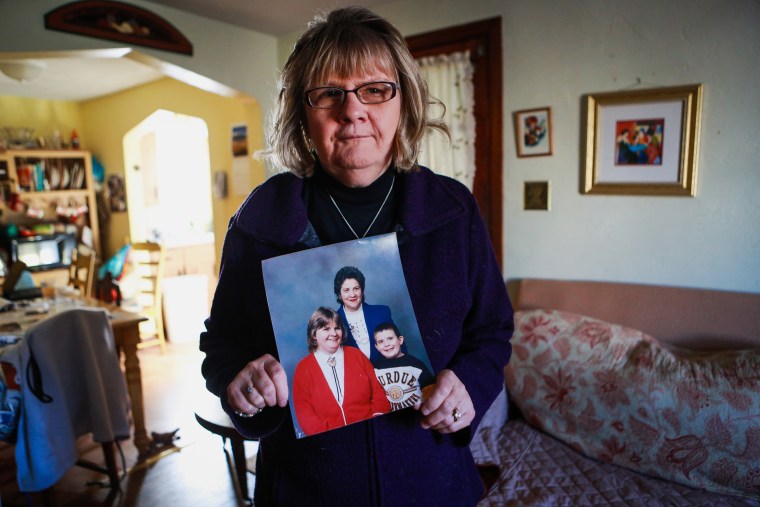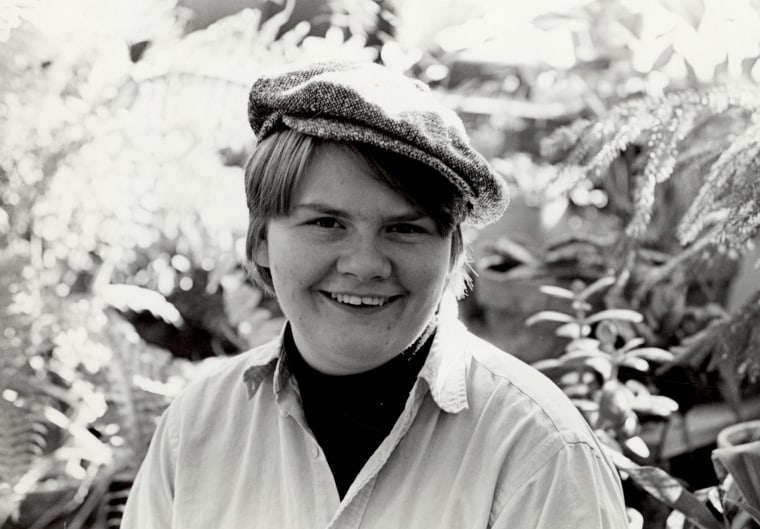Forty-six years ago, on April 2, 1974, out lesbian Kathy Kozachenko was elected to the Ann Arbor City Council in Michigan — becoming the first openly gay person elected to political office in the United States. Then a 21-year-old University of Michigan student campaigning under the local (and now defunct) Human Rights Party, Kozachenko beat her lone Democratic opponent by 52 votes to little fanfare.
“Not a lot of people know about me,” Kozachenko, 67, told NBC News. The accolade of “first elected openly gay official” is often misattributed to Harvey Milk, the boisterous gay icon who was elected to the San Francisco Board of Supervisors in 1977. In fact, Milk was hardly the first LGBTQ person to be elected to political office. Less than a year after Kozachenko was elected, out lesbian Elaine Noble was elected to the Massachusetts House of Representatives.
Kozachenko speculated that there are a few reasons she’s been overlooked by history. Aside from being a woman, she never made her sexuality central to her campaign — a decision that sets her apart from many of her more well-known successors.
“Harvey Milk was a very strong and vibrant gay activist,” Kozachenko said, adding that Milk, who was assassinated a year after his election, was a hero and a martyr. “I was and am a social justice advocate, of which LGBTQ rights comes in.”
There’s another reason few have heard of Kozachenko: She is a fiercely private person. It wasn’t until 2015, when she agreed to be interviewed by a Bloomberg reporter, that she received any media attention. She was 61 at the time, and it was the first time a major publication profiled her life.
Kozachenko said she never intended to enter politics. Rather, politics chose her. She was born in Alexandria, Virginia, but grew up in Toledo, Ohio, where she moved with her father, stepmother (her biological mother died when she was young) and stepsiblings. The family moved again, to the rural community of Plymouth, Michigan, where Kozachenko attended high school. There, she got her first taste for radical activism. With the help of some of her teachers, she organized a discussion for the United Farm Workers at a local library.
After high school, in the early 1970s, she moved to Ann Arbor. Like many college towns at the time, Ann Arbor had become a hot spot for student-led protest over the Vietnam War and racial injustice. At the University of Michigan, Kozachenko, who was studying English and creative writing, became involved in the civil rights movement.
“I am so proud of all the activists that came after me … The people that pushed and pushed and pushed for gay marriage, the transgender people that have pushed for their rights ... I’m grateful for the chance that I was able to play a small part in this.”
The Michigan-based, left-wing Human Rights Party, an early champion for racial justice and gay rights, recruited Kozachenko to run for city council. The party consisted of mostly college students and recent graduates.
“I really believed in the goals of the Human Rights Party and our mission for social justice,” Kozachenko said, “so I wanted to see the organization remain alive, so I agreed to run.”
Unlike most American towns at the time, Ann Arbor was a liberal enclave, Kozachenko recalled— not many people seemed to care if you were gay. She eventually came out as a lesbian. By that time, the Human Rights Party had already been successful in electing two members to the city council: Jerry DeGrieck, a gay man, and Nancy Wechsler, a lesbian, who were both graduates of the University of Michigan. While DeGrieck and Wechsler were not out at the time of their election , the pair made history by becoming the first LGBTQ elected officials to come out while still in office.
The city council led the passage of one of the country’s earliest ordinances protecting against discrimination based on race, national origin, sex, age, religion and sexual orientation in public accommodations. So when members of the party asked Kozachenko to run as an out lesbian, it didn’t seem like a big deal.
“My campaign manager said to me, ‘Well, since you’re running, why don’t we run you as an out lesbian?’” she recalled. “And I said, ‘Yeah, that sounds like a good idea.’”
In fact, the party had so much success championing for gay rights in Ann Arbor that Kozachenko didn’t feel the need to make it central to her agenda.
“This is the first time in the history of the U.S. that someone has run openly as a gay person and been elected to public office,” Kozachenko said during her 1974 victory speech, which was unearthed by Bloomberg. “Gay liberation was not a major issue in the campaign — both candidates in this ward said they supported gay rights, but 10 years ago, or even three years ago, lesbianism would have meant automatic defeat. This year we talked about rent control. We talked about the city’s budget. We talked about police priorities, and we had a record of action to run on. Many people’s attitudes about gayness are still far from healthy, but my campaign forced some people at least to re-examine their prejudices and stereotypes.”
Kozachenko’s political career would be short-lived. After two years on the city council, she opted not to run for a second term. “As hard as we tried to make our organization representative of and inclusive of individuals beyond students — to be a voice for working people, people that were on welfare but trying to move beyond welfare, people of color — we weren’t really able to go beyond being a student organization,” she said of the Human Rights Party. “So the viability of the organization as a vehicle for change, I could see that it wasn’t going to be long term, and I wanted to see where else I could be effective.”
After graduation, Kozachenko moved to New York City, where she joined a group of lesbian and gay socialists, and also volunteered for a group called Dykes and Tykes. “It was an organization that was helping women who had come out after having been married and had children, and their husbands were trying to take their kids away from them for being gay,” she said.
Later, a group of gay activists invited her to Pittsburgh, where she spoke at a rally against anti-LGBTQ activists, including singer Anita Bryant. “I fell in love with the city and basically just decided to move here,” said Kozachenko, who still lives in the city.
In Pittsburgh, she helped recruit people to the 1979 National March on Washington for Lesbian and Gay Rights, the first large demonstration championing gay rights in the nation’s capital. In 1984, she met her longtime partner, MaryAnn Geiger, through mutual friends. Three years later, the couple had a son together, Justin, whom Kozachenko gave birth to in 1987. Geiger died in 2010 from cancer, five years before same-sex marriage would be legalized.

In the 1980s, Pittsburg was far from the liberal safe haven Kozachenko had found in Ann Arbor. While she didn’t hide her relationship with Geiger, she did not talk openly about it, either. “People at my work and so forth thought that I was a single woman who decided to have a child on her own,” she said. But Kozachenko stayed and continued to advocate for social justice, which she does to this day, while also working as a health care service provider.
While Kozachenko’s career as an out lesbian politician was short, she helped pave the way for a movement that led to the legalization of same-sex marriage across the U.S. in 2015 and a “rainbow wave” of out lawmakers in the years following. Today, 855 out LGBTQ political leaders sit in elected office, according to the Victory Institute, a nonprofit that helps train and elect lesbian, gay, bisexual, transgender and queer candidates. In recognition of Kozachenko’s election nearly five decades ago, the Victory Institute now celebrates its annual National Out to Win Day, currently in its second year, on April 2 to encourage LGBTQ people to run for political office
“I am so proud of all the activists that came after me,” Kozachenko said. “The people that pushed and pushed and pushed for gay marriage, the transgender people that have pushed for their rights and for understanding of who they are. I think none of this would have happened without the energy and activism of many, many people not giving up, and I’m very grateful for that, and I’m grateful for the chance that I was able to play a small part in this.”




